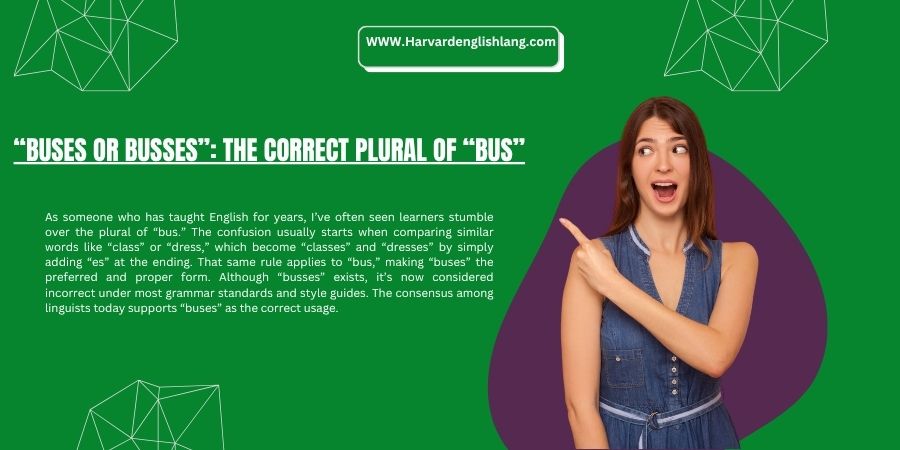I still remember the first time I hesitated before writing the plural of the word “bus.” Was it buses or busses?
As someone who’s spent years in education and studied language-use across British and American English, I’ve seen how even commonly-used terms can spark confusion. While buses is the standard, you might have stumbled upon busses in an old dictionary or written-form.
This variation, though rare, can cause a mistake if you’re not aware of the rules. When we explore English grammar, we see how accepted-usages and spelling-standard evolve, especially in regional or dialect-specific cases.
From a linguistic perspective, the issue ties into inflection, suffix, and suffixation—adding an -es or -ed at the ending of a noun like bus.
While both buses and busses appear, only one is widely accepted in formal usage. The pronunciation of words with a short vowel before a consonant often demands doubling, like nagged from nag or dotted from dot—this is done to preserve the sound.
But with bus, there’s no risk of it turning into a long vowel like kite or cave, so doubling the consonants isn’t practical for pluralization. That’s why we don’t pluralize “bus” as busses in most settings.
Professionally, I’ve applied this concept in many contexts—writing classroom material, training young learners, and helping non-native speakers grasp tense-forms, verbs, and noun structures.
You’ll also find this choice affects sentence-level meaning. Imagine writing about transportation for a restaurant staff training manual and using “bussing tables.”
Now compare that to describing multiple buses for public transport—both correct, but context and purpose change everything.
English is full of such exceptions, shaped by phonology, morphological shifts, and language-nuance. Through consistent use and understanding of spelling-choice, learners can become more confident in their lexical-choice and navigate these subtle distinctions without feeling confused.
Why Is There Confusion?
In my early days of teaching English, I noticed students often felt confusion when trying to choose between “buses” and “busses.”
The issue stems from how plural forms are made in English. Many words that end in “s,” “x,” “z,” “ch,” or “sh” usually form their plurals by adding “es.” That’s why we say “boxes” instead of “boxs,” or “wishes” instead of “wishs.”
Because of this pattern, learners assume that “bus” should follow the same form, leading to the creation of “busses.” And while that does appear in some texts, especially older ones, it’s not the most accepted form today.
The fact is, “buses” has historically become the more widely accepted version. Still, “busses” may be used in specific contexts, often driven by stylistic choices or even for clarity in cases where both the noun and the verb are involved.
Over time, the difference between these two spellings has led to uncertainty, especially in contexts like creative writing or literature where stylistic flair matters.
As someone who works with language closely, I’ve seen how one form becomes dominant simply because it fits better with standard usage. But in truth, both still exist in certain contexts, though “buses” remains the correct choice in most.
You Might Also like: Openned or Opened? Fix Your Spelling Today!
“Buses or Busses”: The Correct Plural of “Bus”

As someone who has taught English for years, I’ve often seen learners stumble over the plural of “bus.” The confusion usually starts when comparing similar words like “class” or “dress,” which become “classes” and “dresses” by simply adding “es” at the ending.
That same rule applies to “bus,” making “buses” the preferred and proper form. Although “busses” exists, it’s now considered incorrect under most grammar standards and style guides. The consensus among linguists today supports “buses” as the correct usage.
If we look back at older texts from the 18th and 19th centuries, “busses” was sometimes used, but this spelling is now viewed as outdated. In modern usage, clarity and consistency matter more than ever, and conventions have evolved to reflect that.
While I’ve come across “busses” in historical writing or specific style choices, the overwhelming majority now use “buses.” This shift follows how other plurals are formed from words ending in “s.” Language naturally evolves, and what was once common may now be used less.
As a language instructor, I always encourage learners to follow spelling and grammatical conventions rooted in modern practice for clarity and correctness.
Sentences Using “Buses”
- Buses arrive at this stop every 15 minutes.
- Many buses were delayed because of the heavy rain.
- School buses are painted yellow for visibility.
- The city added new electric buses to reduce pollution.
- Tourists often use double-decker buses to explore the city.
- During rush hour, the buses are usually very crowded.
- Some buses have Wi-Fi and charging ports for passengers.
- The strike caused all public buses to stop running.
- These buses go directly to the airport without any stops.
- She prefers buses over trains for short-distance travel.
Sentences Using “Busses”
- The waiter busses the tables quickly after customers leave.
- In older texts, you’ll sometimes see “busses” instead of “buses.”
- He busses dishes back to the kitchen during the lunch rush.
- Although “busses” is used, “buses” is the more accepted spelling today.
- She busses at the café part-time while studying.
- Some authors still use “busses” for stylistic reasons.
- The server busses everything off the table before dessert.
- Historically, “busses” appeared more often in 18th-century writing.
- The staff busses the entire dining area before closing.
- “Busses” is now rarely used as a plural for “bus” in modern writing.
You Might Also like: Pre-Existing or Preexisting: Which One is Correct?
What to Know for Using “Busses vs Buses” in Content Writing

In professional and academic writing, especially for online platforms, it’s crucial to use the correct terms like buses or busses consistently. Many audiences, including readers and clients, expect clarity and credibility in your content.
From personal experience, misusing these terms not only confuses the audience, but can also negatively affect your SEO, rankings, and search engine optimization efforts.
A small mistake in usage can reduce trust, especially when writing for a critical or highly-engaged audience.
To maintain a strong online presence, writers must understand the common pitfalls when choosing between “buses” and “busses.”
It’s essential to ensure you use the proper spelling depending on the context. If your goal is to improve results and keep rankings lower in bounce rates, you must write correctly and avoid errors that might harm your credibility.
When writing for audiences that care about language quality, choosing the right word strengthens your message and showcases your attention to detail.
Conclusion
From my experience as a language educator, choosing the correct word form helps maintain clarity and professionalism, especially in formal writing.
The plural of bus has sparked some confusion, but modern English usage widely favors buses. The word busses, though it exists, is now considered outdated or inaccurate, mostly used in very rare contexts like referring to kisses.
For anyone aiming to build accurate communication, this small detail can shape the overall understanding of your text.
The term bus originates from the Latin word omnibus and follows the standard pluralization rule in English — add “-es” when the word ends in “s.” This rule ensures we stay in line with accepted grammar conventions.
Whether you’re referring to public transportation or discussing vehicles in an academic or everyday setting, your best choice is “buses.” Over time, “buses” has become the preferred and primary form in both formal and casual usage. Knowing these distinctions not only sharpens your writing but also improves your professional tone, particularly when the term is used in various contexts.

An IELTS and TOEFL expert who has guided hundreds of students to achieve high scores. His strategic approach to exam preparation ensures confidence and success.
